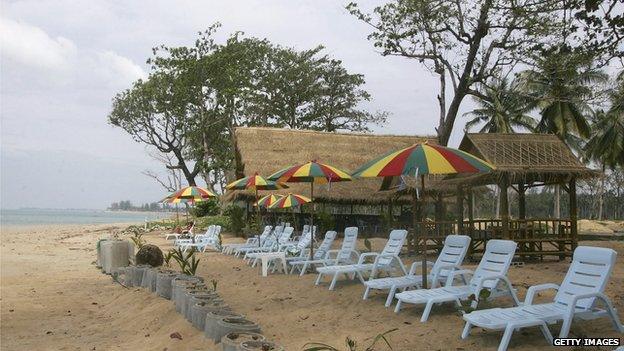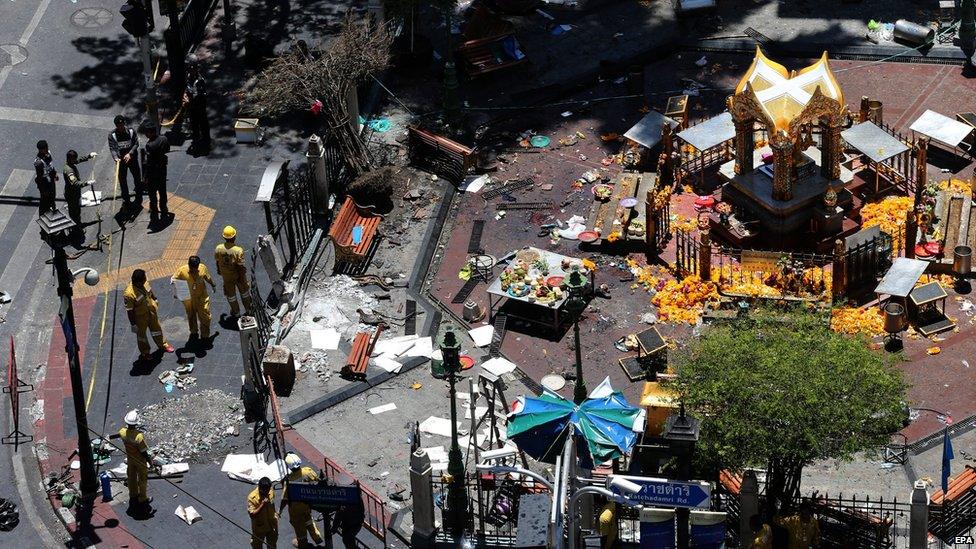The Bangkok attack could be a major setback for tourism
- Published

Thailand desperately needs tourists to fill these chairs
As I write this, Thai authorities have re-opened the Erawan shrine after the devastating attack on Monday that killed more than 20 people and injured scores more.
The speed at which the government has moved to take control of the narrative shows just how much pressure they're under to display they're in charge.
Observers say officials are trying to put on a show of "business as usual" at the shrine and the surrounding areas, encouraging people to visit and pay their respects. Most of the offices, schools and businesses in the area have remained open - political analysts say the government is desperate to retain an air of normality in the capital.
But industry experts say it will take more than this initial show of strength to convince investors and visitors that Thailand is still a safe place to do business in and to go on holiday to.
"It's a shocking incident, and the worst of its kind," Andrew Herdman, the director general of the Association of Asia Pacific Airlines told me. "It's bound to affect tourism, tourists will be fearful, and tourism is a key pillar of the economy."
Mobile phone footage shows the moment of Monday's bombing in Bangkok
Turmoil
Thailand is no stranger to turmoil. Its economy has had a rough ride over the last few years. But the one thing I remember business people telling me while I was there covering the political instability, the floods and the protracted protests is that Thailand always bounces back.
And in the past, that maxim has proved true most of the time.
But this time, there are concerns it won't be so easy.
Unusually, even the government has pointed to the fact that this time the economy was a target. The prime minister Prayuth Chan-ocha said that it was the "worst ever attack" on Thailand, and that "they want to destroy our economy, our tourism".
Tourism accounts for 10% of GDP and has been one of the bright spots in the economy. This year in particular, after the continuing political protests in the last 18 months, many had hoped tourist arrivals would help to push growth higher. Foreign tourist numbers were up almost 40% in the April to June period of this year - in contrast exports fell by more than 5% during the same time.

Authorities believe foreign tourists were the target - but most of the dead and injured are Thai
Major setback
ANZ Bank says tourism is the only sector driving growth in Thailand at the moment and that "a loss of momentum in the sector will present a new downside risk to economic activity".
Ratings agency Standard and Poor's added the "attack has increased uncertainties over political stability and will put additional pressure on near-term economic prospects".
That's the last thing Thailand needs. Most analysts say growth prospects could be hit hard if the government doesn't act decisively and show it's in control of the situation.
Also key will be whether there are any further attacks. Economic growth data out on Monday - released just hours before the attack - showed that economic performance was weak in the first half of 2015, coming in at 2.8%.
That's one of the weakest rates in South East Asia and is coming at a time of renewed concerns about global growth given the slowdown in China.
Thailand was only just starting to see an improvement in its economy. This attack could be a major setback in the short-term.